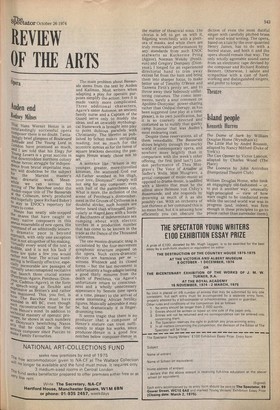opera
Auden end
111,0ney Eines That Hans Werner Henze is an outstandingly successful opera c,OroPoser there is no doubt. Tantalisingly brief glimpses of Boulevard S, Witude and The Young Lord in London have promised as much, and 1 am told that his Elegy for Young Lovers is a great success in that downtrodden northern colony nose heroic struggle for indepenuence from brutal imperialist masters
Will doubtless be the subject
"or the Marxist master's next dramatic work. MeanWhile we can savour his setting of The Bacchae under the Auden-esque title of The Bassarids at the Coliseum, newly produced and hopefully (pace Richard Baker) to stay in ENOC's repertory for Years to come.
Henze has neatly side-stepped
the snares that have caught so illenY native composers in this (7rIntis rniserabilis of new opera. His 1.-"Irnand of an admittedly leisure dramatic pace is beyond thteProach, with only one exception ,at is not altogether of his making. every word of the text Is th audible' and it is not his fault if 'ere are quite a few you would rather not hear. The actual words? ttin... g is brilliantly effective; espevietratauyairyemorable are passages of
unaccomapnied recitative unaccomapnied recitative
that launch three crucial scenes 0)entheus/Agave, Pentheus /DionoYsus, Cadmus/Agave), in the form sPeech-song as flexible and 1Pressive as Britten's and rather .ss mannered. This, you feel, is snC:.W The Baechae must have '",",nded in 405 BC, even though fr o reconstruction must be far te °in Henze's mind. In addition to c,..chnical mastery of operatic proses, he shows in such numbers an onysus's bewitching Naxos that he could be the first composer since Puccini to "le Family Favourites. The main problem about Bassarids stems from the text by Auden and Kallman. Most writers when adapting a play for operatic purposes simplify the action; here it is made vastly more complicated. Three additional characters, Agave's sister Autonoe, an ancient family nurse and a Captain of the Guard serve only to muddy the ideas, and an unwieldy mythological framework is brought into play to point dubious parallels with Christianity. The libretto as published by Schott makes intriguing reading, not so much for the eccentric syntax as for the forest of square brackets denoting the passages Henze wisely chose not to set.
A sentence like "Where is my younger, greater, more-travelled kinsman, the scattered God our All-Father wombed in his thigh, your love, Dionysus?" simply will not sing for any composer, even with half of the parentheses cut. What is more, the inclusion of the scene of Pentheus's dismemberment in the Groves of Cytheron is a doubtful stroke; such horrors are better heard than witnessed, particularly as staged,here with a horde of Bacchantes of indeterminate sex romping about with electric torches in a production number that has come to be known in the trade as the Dance of the Thousand Usherettes.
The one musieo-dramatic snag is occasioned by the four-movement symphonic structure imposed on the opera. Such extra-dramatic devices are harmless per se – witness Wozzeck and its closed forms – but the last movement is unfortunately a huge adagio lasting a good thirty minures from the death of Pentheus, via Agave's unfortunate return to consciousness and a wholly unnecessary appearance by Semele (one opera at a time, please) to the arrival of some interesting African fertility figures. Musically admirable it may be, but dramatically it is fingerdrumming time.
It seems tragic that there is no producer that a composer of Henze's stature can trust sufficiently to stage his works, since producer-Henze is a good few notches below composer-Henze in the matter of theatrical nous. 1 ne chorus is left to get on with it, fidgeting wretchedly with a plethora of masks, and while there are truly remarkable performances by any standards from such ENOC stalwarts as Katherine Pring (Agave), Norman Welsby (Pentheus) and Gregory Dempsey (Dionysus), I longed for an experienced directorial hand to trim away excess fat from the ham and bring them into sharper focus, to make better use of Timothy O'Brien and Tazeena Firth's pretty set, and to throw away their hideously unflattering costumes. The comic intermezzo, surely a sour comment on Apolline-Dionysiac power-sharing rather than Oedipal therapy, as has been suggested (one play at a time, please), is its own justification, but it is so coarsely directed and costumed as to nullify that quirky camp humour that was Auden's most endearing trait. Despite these reservations, all of them remediable, The Bassarids shines brightly through the murky world of contemporary opera, and nowhere more brightly than in comparison with the week's other offering, the first (and last?) London performance of Thea Musgrave's The Voice of Ariadne at Sadler's Wells. Miss Musgrave, a genial composer of music-music as opposed to drama-music, is saddled with a libretto that must 'be the silliest since Helmine von Chezy's Rosarnunde, and she responds by drowning as much of it as she possibly can. With an orchestra of just thirteen at her command this is no mean feat, but it is amazing how efficiently you can obscure the diction of even the most dutiful singer with carefully pitched brass and wood wind writing. The opera, based on a tale by the over-quarried Henry James, has to do with a buried statue, and both it and the opera should remain that way. The only wholly agreeable sound came from an electronic tape devised by the composer and Richard Rodney Bennett. Otherwise, I salute and sympathise with a cast of hardworking and distinguished singers, and prefer to forget.










































 Previous page
Previous page